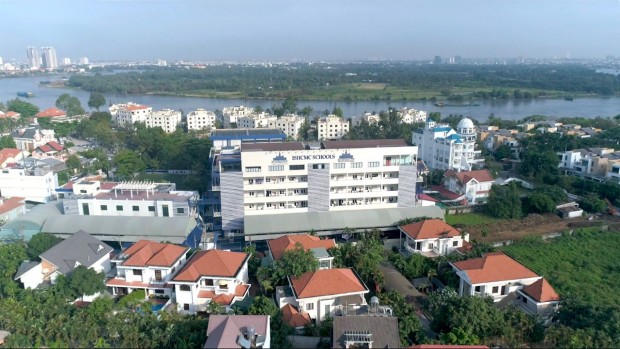How ISHCMC - American Academy Students Benefit From Outdoor Activities and Field Trips
By David Thompson
Photo : ISHCMC
It's not often that a child's education takes place outside of a classroom or studio. Time spent outdoors during school hours is usually in service of an athletics program or team sport. However, at ISHCMC - American Academy, Vietnam's leading American international secondary school, outdoor learning is not only encouraged, but it's an essential part of the student experience.
Through the School's Outdoor Education Field Studies Program, students enjoy field trips across their home country and Southeast Asia. ISHCMC - American Academy says the benefits of outdoor activities can have a major influence on students' health and well-being. The Academy's focus on outdoor learning reinforces its aim to help students learn in a challenging, collaborative environment, where they can develop the resilience and responsibility they need to thrive throughout life.
Adventures in the Great Outdoors
Jungle trekking, rock climbing, and environmental cleanups are some of the adventures that await students attending ISHCMC - American Academy. The School's Outdoor Education Field Studies Program works in tandem with the curriculum and provides numerous opportunities for students to gain leadership experience, build independence and resilience, and have fun with peers.
The trips vary between school years and age groups. In the past, students have undertaken historical excursions, like a visit to Cambodia's Angkor Wat to learn about ancient and modern civilizations, geological explorations to places like the Vietnamese coastline, collaborations with other Vietnamese schools, and other community projects. One such project involved students helping clean up areas around Hội An port.
The outings adhere to strict international risk management standards, and expert outdoor education staff plan and lead the trips, ensuring students stay safe and engaged throughout.
Students can also take part in a variety of outdoor extracurricular activities, joining competitive volleyball, basketball, soccer, and badminton teams.
What's more, ISHCMC - American Academy plans to expand its outdoor education program for middle and high school students yet further over the next five years.
Positive Education and Happy Students
The program borrows from the Positive Education learning model, an approach to children's education that combines the principles of traditional schooling with the study of happiness and well-being. Positive Education derives from Martin Seligman's PERMA model. One of the founders of the positive psychology movement, Seligman fused positive psychology with education models to lower rates of depression in young populations and enhance their overall health. Schools that use the Positive Education model hope to promote positive mental health among students by developing every aspect of a child, not just their academic strengths.
ISHCMC - American Academy believes its expeditions imbue students with broader, longer-term skills that prove valuable throughout their lives. For instance: building confidence, inspiring community involvement, strengthening relationships, learning how to work well as part of a team, and honing decision-making skills. Moreover, students get the chance to apply knowledge learnt in the classroom to real-life situations and develop a deeper cultural, social, and historical understanding of their world.
ISHCMC - AA is one of three Vietnamese members of the Cognita Schools Group, a global group with approximately 80 participating schools in Asia, Latin America, and Europe and 7,500 teaching and support staff. The Cognita ethos is to provide an education that helps children create sustainable physical, social, and emotional growth during their time at school that will serve them for life.
Cognita's family of schools ensures each student receives a rounded education and the skills to succeed in a fast-changing world. As such, ISHCMC - American Academy delivers academic excellence, develops character, and nurtures a global perspective in its students. Additionally, ISHCMC - AA participates in Cognita's annual Global Be Well Day each September, which swaps the curriculum for a day focused on well-being.
Our Relationship With Nature
Long before the Covid-19 pandemic, studies have shown the negative impact a lack of time spent in nature can have on mental health. Screens are everywhere, and the pull from computers and mobile devices has been a factor in significantly decreasing the amount of time we spend outdoors. One study from 2020 concluded that both a rise in technology and a decrease in independent mobility, i.e. parents allowing children out alone less than in previous generations, played a part in the reduced time spent outdoors, especially for older children.
In the last couple of years, spurred on by dramatic changes in the way the pandemic altered how and when we leave our homes, the number of studies finding the benefits of the outdoors on children has risen. Though most scientists won't state that nature categorically improves children's mental health, most studies conclude that nature does positively impact children's holistic well-being, including benefits to mood and attention. This means great things for improving a child's performance in the classroom.
In addition, studies have shown that exposure to green spaces positively correlates with improvements in children's physical activity levels. This may offer its own benefits to emotional well-being when we consider the impressive evidence for the links between exercise and mental health.
Nature Connectedness
ISHCMC - American Academy firmly believes that outdoor activities are essential for a child's holistic well-being. On top of the proven benefits for a child's learning development and physical and mental health, natural environments provide the perfect setting for play and interaction with peers. These environments also help children appreciate natural surroundings and build connections with nature. Studies in nature connectedness, a concept that describes the relationship between people and nature, have found that those who have a deeper connection with nature tend to function well and self-report higher levels of personal growth.
Often, the ISHCMC - AA's outdoor education experiences are among students' most special memories of school. One Grade 7 student reported a personal breakthrough while rock-climbing on a trip to Cat Tien National Park and Madagui: "First I was very scared that I would fall because I am afraid of heights. But when I reached the top after many times wanting to give up, I realized that I can do everything."
About ISHCMC - American Academy
International School Ho Chi Minh City - American Academy in Vietnam, also known as ISHCMC - American Academy, inspires students aged 11 to 18 to achieve their academic and personal bests. Students study an American-based curriculum in a positive, caring, and engaging learning community, with many opportunities for extracurricular pursuits in the visual and performing arts, robotics, computing, and more. Alongside comprehensive English language immersion from the age of 11, students embark on an extensive Vietnamese Studies Program that teaches them the importance of their language and culture.
ISHCMC - American Academy offers a holistic approach to teaching, prioritizing children's mental health and well-being by providing access to guidance and counseling services. The School assigns an advisory teacher to each student, who is responsible for their general welfare. During four weekly advisory classes, students learn the tenets of the Positive Education model and safeguarding behaviors, receive academic and career counseling, and, if necessary, more individualized academic support.
Through its university-level courses with both Advanced Placement and Syracuse University Project Advance, children have an unparalleled opportunity to gain entry to top U.S. and international universities and colleges.
* This is a contributed article and this content does not necessarily represent the views of universityherald.com









